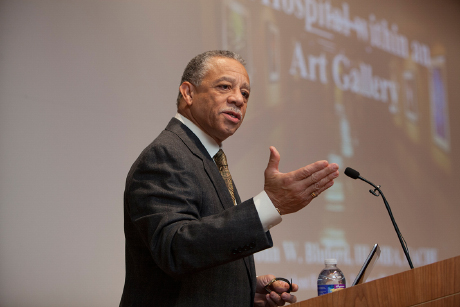Hospital exec shares how to transform urban health care
By Kenny Berkowitz

Fifteen years ago, when John W. Bluford III became president of Truman Medical Center (TMC), the Kansas City hospital was facing serious financial problems, legal issues and low morale. People saw it as a place to be treated if you were poor, uninsured or had nowhere else to go, Bluford said.
By the time Bluford retired earlier this year, the institution had completely turned around. Nationally recognized for its standard of care, TMC has grown to include state-of-the-art centers for cardiology, diabetes, emergency medicine, obstetrics, oncology, outpatient surgery and radiology. Its annual net operating revenue has increased by $283 million, and with a broad range of community-based initiatives, TMC has become widely seen as a model for innovation and civic engagement.
“If you want to change the dance, change the music,” said Bluford, quoting an African proverb on campus Nov. 13 at Cornell’s inaugural Percy Allen II ’75 Sloan Lecture in Health Care Leadership in Urban Communities, hosted by the Sloan Program in Health Administration in the College of Human Ecology. “I like that. It’s got a nice rhythm to it that reflects what we need to do as an industry, as a field, to make a difference in the lives of the people we serve.”
In his lecture, “Thinking Outside of the Bed,” Bluford emphasized the importance of maintaining the health of the most vulnerable members of the community, beginning with early childhood education and continuing with programs to address drug addiction, mental illness, chronic disease, poor diet, lack of exercise and inner-city violence.
In response, TMC has changed the way people use their facility, adding a bank to the first floor and a seasonal produce market outside the building. At the same time, TMC has reached beyond the hospital grounds, sending fresh produce into surrounding neighborhoods on a mobile market, founding a wellness program at the public library, using unrented billboards to underline positive messages about health, providing home refrigerators for diabetic patients, co-sponsoring a family health festival with the Kansas City Chiefs, and making plans to build a full-service grocery store in the heart of the inner city.
“We’re talking about health versus care,” said Bluford. “That’s the transformative element. We need to go from giving care to maintaining health, and the challenge, among many, is how do you get paid for that? The system doesn’t reimburse us for keeping people healthy … yet.”
“This is what you’re going to be facing, and you’ve got to figure it out,” Bluford told students. “Make a difference. Because if you’re doing what you’re supposed to be doing, you won’t have a lot of patients.”
The lecture series, which brings leading health care administrators to campus to address the needs of underserved urban communities, honors Percy Allen II, MHA ’75, who serves as an executive-in-residence in the Sloan Program. Previously, Allen served as CEO of University Hospital of Brooklyn, CEO of the Bon Secours Baltimore Health System, and president of the National Association of Health Service Executives (NAHSE). He was inducted into the NAHSE Hall of Fame in 2006 and into the Modern Healthcare Hall of Fame in 2011.
Kenny Berkowitz ’85 is a freelance writer.
Media Contact
Get Cornell news delivered right to your inbox.
Subscribe